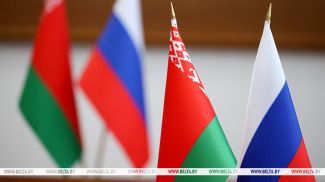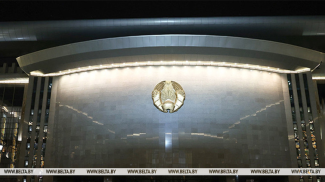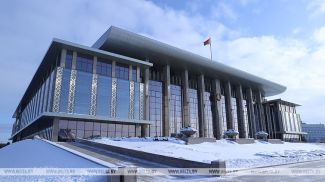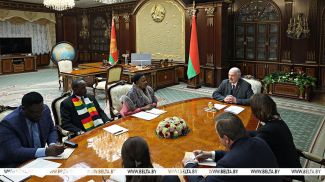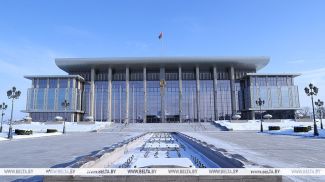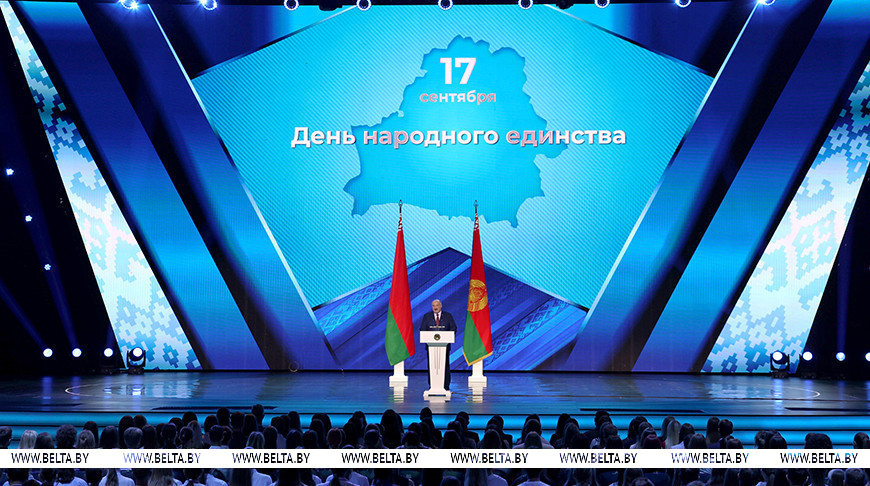
MINSK, 17 September (BelTA) – People’s Unity Day symbolizes the eagerness of Belarusians to live in their own state and in their native land. Belarus President Aleksandr Lukashenko made the statement during a solemn event held on 17 September on the occasion of People’s Unity Day, BelTA has learned.
“Today Belarus marks People’s Unity Day. It is a holiday that symbolizes the unbreakable connection of generations, the strength of the spirit of the Belarusian nation and its relentless eagerness to live in its own state and in its own native land. It is particularly significant for everyone, who feels they are Belarusians by soul and heart and not only by birth,” Aleksandr Lukashenko stressed. “A fateful event took place 85 years ago and the proud line ‘We are Belarusians’ was stated from the very center of Europe for the entire world to hear. It was the voice of people, who became a united nation. United forever then!”
The head of state remarked that for a long time the modest abode of Belarusians at the crossroads of civilizations often became a shooting range for someone else’s wars and a place for shoving matches of the powers that be. “Our homes were burned. Our property was looted. Lands were split into principalities, voivodships, and provinces. People were split depending on their language, faith, and ideological convictions. Our ancestors looked into the face of death many times but every time they rose from their knees unbroken. They wiped their sweat and tears and moved forward. Which is topical today,” the president stated.
Aleksandr Lukashenko reminded that the road towards gaining a statehood of their own was opened before Belarusians at the beginning of last century. “Previous interethnic disputes were over. Territorial claims were forgotten. And a Belarusian national state was created on 1 January 1919. We were offered a historic chance to build a home of our own, to live, work, and raise kids in peace and accord, to become full masters of our own fate. A chance… The year 1919… But the heavy consequences of World War One, the growing Civil War, the intervention by a coalition of Western countries did not allow our compatriots’ dreams about a peaceful and happy life to come true. Which is topical today,” the Belarusian leader remarked once again.
“The voice of the newly established Belarusian Soviet republic was barely heard against this background. Possibly because there was no unity inside it. But there were those, who thought only about personal gains and their own interests instead of people’s interests. Nationalists of all kinds rushed to appoint themselves the government. And everyone, who was desperate to rule the new state hid behind the name of the Belarusian nation while the nation was poor and hungry, poorly educated and wearing bast shoes, tired of war and destruction, and only thought about how to survive,” Aleksandr Lukashenko stressed. “If we had had a strong government and accord at the dawn of last century, we could have survived. And the tragedy of the Treaty of Riga, which made 4.5 million sons and daughters of Belarus strangers to each other in their native land, would not have happened.”
All the guarantees of national cultural life as part of the Polish state remained only on paper. Western Belarus had zero autonomy, the president remarked. The Belarusian culture existed in conditions of a constant fight for survival. National schools, theaters, and newspapers started disappearing.
“The nation was being destroyed. Over 3,000 people imprisoned due to political reasons fell victim of inhumane repressions. Those, who did not want to become Poles, who talked, prayed, and sang lullabies to kids in their native tongue, were subjected to torture and imprisonment in concentration camps and prisons. 17 September 1939 saw the Polish shackles fall under the onslaught of historical justice. The liberation march of the Red Army reunited families and the forcibly separated territories. But Belarusians did not sit idle all this time. They did not humbly wait for their liberation. All this time our ancestors held on to their roots and to the land. They passed the memory and the history of their ancient kin from generation to generation. Our language, faith, and spiritual unity did not allow us to forget who we truly are. It is what made them stronger. And nothing could stop Belarusians. Neither threats of Poles nor political borders,” the head of state pointed out.
In his words, tempered by the national liberation movement, the heroic ancestors of Belarusians became an impregnable shield in the way of the Nazi onslaught during the Great Patriotic War of 1941-1945. They rebuilt the country from the ashes after the war. They overcome the chaos of the 1990s and have built a sovereign and independent state.
“For the first time in their history they not only built it but preserved it. And it was accomplished by you and I, including by the people sitting in this huge hall,” the Belarusian leader stated.




